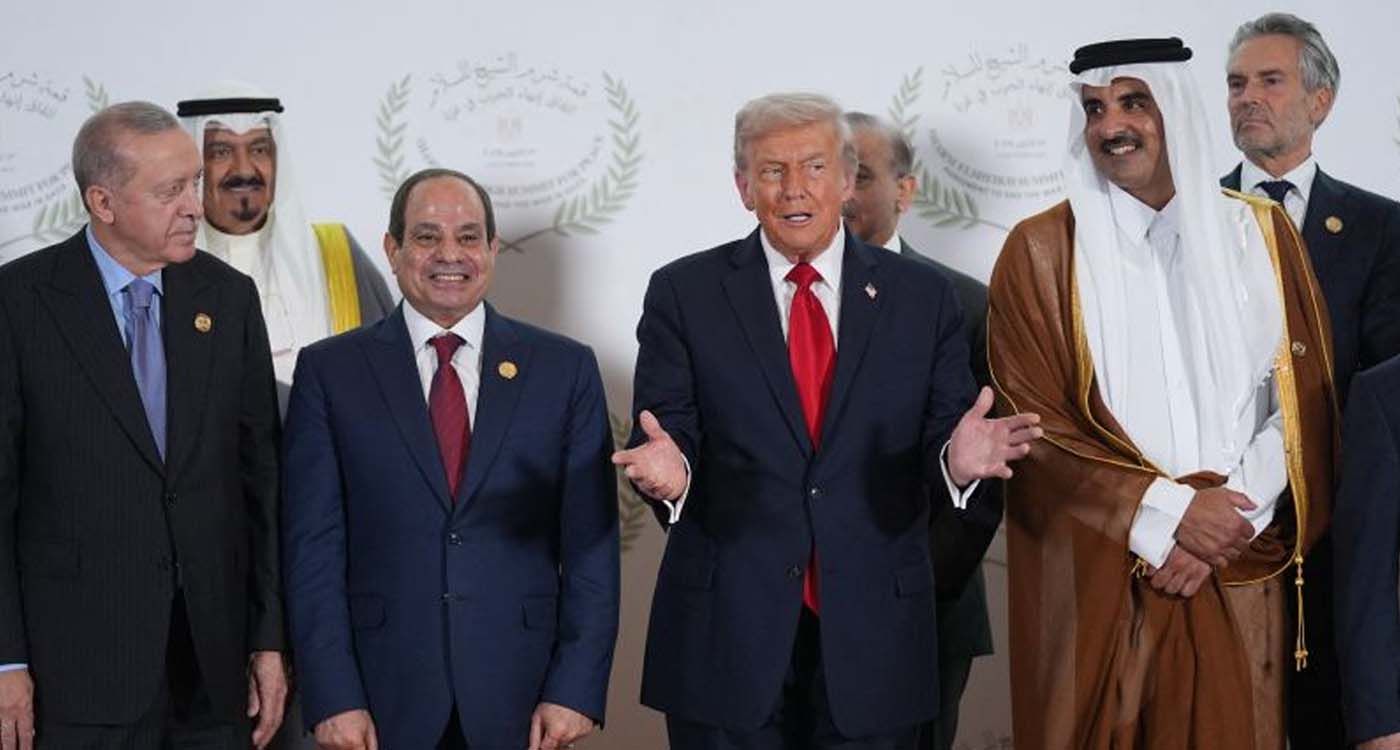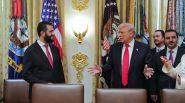- Home
- Middle East
- Global Leaders Welcome Israel-Hamas Ceasefire Agreement

©Evan Vucci/Pool/AFP
Leaders around the world have welcomed the ceasefire agreement reached between Israel and Hamas, formalized at a summit in Sharm el-Sheikh, Egypt, on October 13, 2025. The initiative was driven by US President Donald Trump and signed jointly by mediators from Egypt, Qatar and Turkey. The agreement calls for a halt to hostilities, the release of the last 20 Israeli hostages still alive, the exchange of roughly 2,000 Palestinian prisoners and a massive influx of humanitarian aid.
Washington: Rare Bipartisan Support
Following his visit to Sharm el-Sheikh, Donald Trump claimed a central role in brokering the truce. The US president hailed the agreement as “historic” and thanked regional mediators for their “courageous commitment to peace.”
His predecessor, Joe Biden, expressed that he was “deeply grateful and relieved” that the day had come “for the 20 remaining hostages and for Gaza’s civilians.” While noting that his administration had “worked tirelessly” toward these goals, he congratulated the Trump team for bringing the ceasefire agreement to fruition.
Israel: Government and Opposition Aligned
In Jerusalem, Prime Minister Benjamin Netanyahu called the agreement a “decisive turning point” and thanked Trump for his “leadership.” He framed the deal as a diplomatic victory, backed by military operations in Gaza, and praised the US president as Israel’s “greatest friend” as Hamas released the last 20 hostages under the new peace framework.
Addressing Trump at the Knesset, opposition leader Yair Lapid lauded the American president for “saving millions from the horrors of war,” asserting that he had “achieved the unimaginable.”
Palestinian Voices: Between Opportunity and Red Lines
Hamas described the deal as “aimed at ending the war,” outlining the withdrawal of Israeli forces, the entry of humanitarian aid and a prisoner exchange. The movement thanked Qatar, Egypt and Turkey for their mediation efforts, while urging guarantors to ensure that Israel honors its commitments. On the ground, Hamas forces were redeployed in Gaza to maintain order—a move raising early questions about the durability of the ceasefire.
Palestinian Authority (PA) President Mahmoud Abbas, present at the Sharm el-Sheikh summit, backed ongoing mediation efforts. The PA also expressed willingness to participate in a transitional administration under international supervision—a particularly sensitive prospect, given Hamas’ opposition to any imposed disarmament.
Mediators at the Forefront: Egypt, Qatar, Turkey
As the host country, Egypt reaffirmed its role as a central mediator, aiming to guarantee the ceasefire, secure humanitarian corridors and lead discussions on stabilization and reconstruction through an international monitoring mechanism.
Qatar’s Foreign Ministry spokesperson, Majed Al Ansari, confirmed an agreement on the first phase: cessation of hostilities, release of Israeli captives and Palestinian prisoners and delivery of humanitarian aid, with operational details to be announced later.
Turkey welcomed the development as “deeply encouraging.” President Recep Tayyip Erdoğan thanked Washington, pledged close monitoring of the plan’s implementation and called for immediate humanitarian access and reconstruction without delay. Ankara reiterated its commitment to a two-state solution and active involvement at every stage of the agreement.
Arab World: Cautious Endorsement
Saudi Arabia, represented by Foreign Minister Prince Faisal bin Farhan Al Saud, praised the agreement and the mediators’ role, while demanding concrete guarantees for humanitarian commitments to prevent a relapse.
The United Arab Emirates, whose delegation was led by Sheikh Mansour bin Zayed Al Nahyan, expressed support for the ceasefire as a “positive first step” toward calm, while emphasizing the need to implement commitments and strengthen humanitarian aid in Gaza.
King Abdullah II of Jordan, also present in Sharm el-Sheikh, called for enhanced regional coordination for reconstruction, stressing the importance of Palestinian sovereignty and legitimate representation in post-conflict governance. Regional capitals are now awaiting concrete actions—funding, corridors, institutions—beyond declarative statements.
Europe: Support and Financial Leverage
French President Emmanuel Macron, attending Sharm el-Sheikh alongside British Prime Minister Keir Starmer, Italian Prime Minister Giorgia Meloni and German Chancellor Friedrich Merz, reaffirmed France’s intent to “play an active role” in Gaza’s stabilization and reconstruction. He also emphasized the need for strict human rights oversight and durable political guarantees, particularly through reviving the two-state solution. Paris offered to consider participation in a potential international stabilization force.
In the UK, Starmer called the ceasefire announcement on October 9 a “moment of profound relief” for hostages and Gaza’s civilians. London simultaneously pledged targeted humanitarian aid focused on water, sanitation and hygiene, and proposed an international conference on Gaza’s reconstruction—explicitly excluding Hamas from any future administrative role.
The conference opened on October 13 at Wilton Park, near London, with representatives from the PA and several international donors. According to Downing Street, it brought together “various international partners,” including Germany, Italy, Saudi Arabia and Jordan, as well as private-sector actors and major funders such as the European Bank for Reconstruction and Development (EBRD) and the World Bank.
The conference aims to coordinate and plan post-conflict reconstruction efforts in Gaza, a process “led by the Palestinians,” London emphasized.
Germany’s Chancellor Merz described the initial steps as “encouraging” and pledged strong support for the process. Italy’s Prime Minister Meloni hailed the development as “extraordinary” and affirmed Rome’s readiness to contribute to stabilization and reconstruction.
Brussels and other European capitals have conditioned substantial support on transparent oversight mechanisms and guarantees on the use of funds and protection of civilians.
Iran: Strategic Pragmatism
Although a longstanding supporter of resistance movements in the region, including Hamas, senior Iranian officials have remained silent on the Gaza-Israel peace deal. In a statement issued on October 9, Iran’s Foreign Ministry reaffirmed support for ending what it described as “genocide in Gaza,” while refraining from directly commenting on the Cairo-brokered truce.
The statement called for Israeli troop withdrawals, unimpeded humanitarian access and respect for Palestinian rights, urging international vigilance regarding Israel’s actions. It stressed that ending hostilities does not absolve the international community from its duty of justice or the need to hold accountable those responsible for war crimes and crimes against humanity in Gaza.
UN and WHO
UN Secretary-General António Guterres welcomed the ceasefire announcement and the hostage release agreement. He praised mediators, called for full compliance with commitments and urged immediate humanitarian access to Gaza, framing the UN effort as part of a credible political path toward a two-state solution.
The World Health Organization (WHO) declared its readiness to scale up operations in Gaza. Director-General Tedros Adhanom Ghebreyesus described the announcement as “a major step” if all parties uphold the agreement, with prospects for enhanced emergency care and rehabilitation of a strained health system.
China: Mediator Image
China welcomed the truce announcement, calling for a “comprehensive and permanent ceasefire” in Gaza. Beijing positioned itself as a stability actor and defender of multilateral dialogue in the region.
China “supports the principle that Palestinians must govern Palestine” and backs a “two-state solution” as the only path to lasting peace, said Foreign Ministry spokesperson Guo Jiakun at a Beijing press briefing. “We are ready to cooperate with the international community to achieve a comprehensive, just and sustainable solution to the Palestinian issue, and a peaceful, stable Middle East,” he added.
Elsewhere…
The Kremlin welcomed the agreement, stressing that its success depends on implementation and linking the diplomatic achievement to other regional issues. “We fully support these efforts. One can only welcome a ceasefire in Gaza taking shape,” said Kremlin spokesperson Dmitry Peskov.
In India, Prime Minister Narendra Modi “welcomed” the agreement, hoping that the release of hostages and enhanced humanitarian access would pave the way for lasting peace.
Pakistan’s Shehbaz Sharif called it a “historic opportunity” to end the “genocide in Gaza,” praising mediators and honoring the suffering of the Palestinian people.
In Japan, government spokesperson Yoshimasa Hayashi described the deal as an “important step” toward de-escalation and a two-state solution, with Tokyo pledging to contribute to humanitarian aid and reconstruction.
In Australia, Prime Minister Anthony Albanese applauded an “essential” breakthrough after “more than two years” of war, thanking mediators and reaffirming the two-state solution goal.
Canada’s Prime Minister Mark Carney expressed relief for the hostages’ families and called for swift implementation of the agreed terms to achieve lasting peace.
Finally, while most regional and international actors have welcomed the agreement, one voice remains absent: Hezbollah. In Lebanon, the Iran-aligned Shia militia, usually quick to comment on any developments related to the Israeli-Palestinian conflict, has stayed silent, highlighting its isolated position in the regional landscape.
Read more




Comments